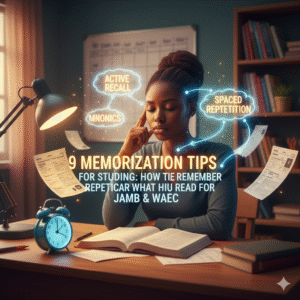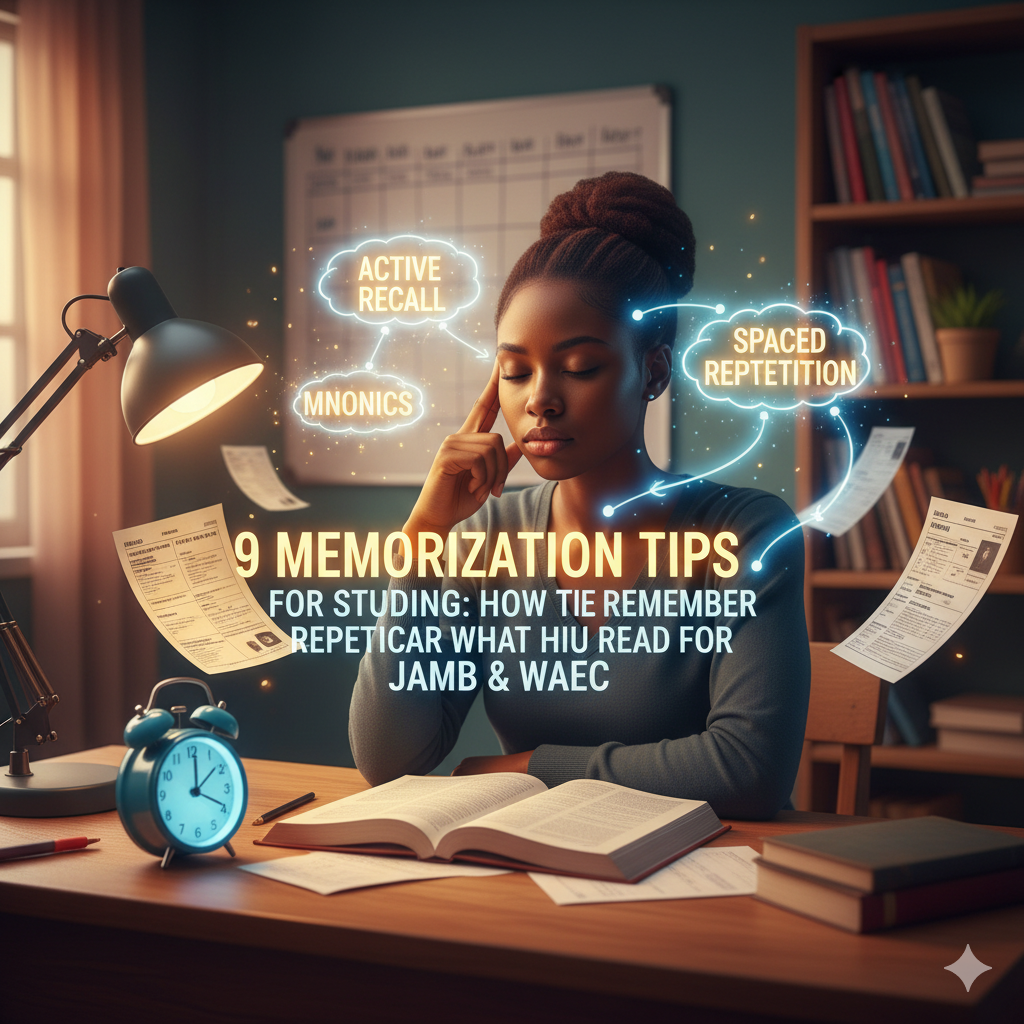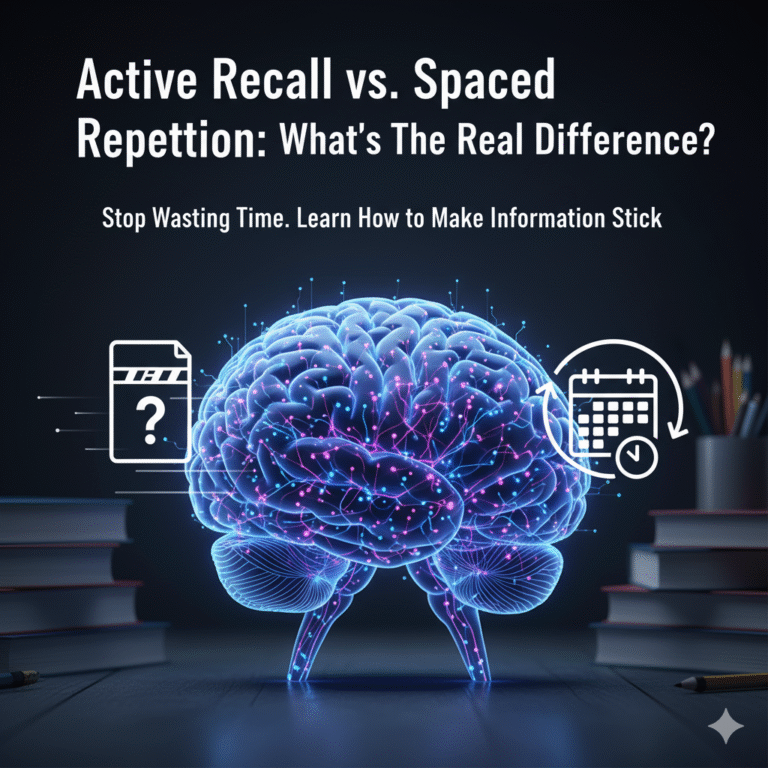9 Memorization Tips for Studying: How to Remember What You Read for Your Exams
9 Memorization Tips for Studying: How to Remember What You Read for Your Exams
Ever entered the exam hall, seen the first question on your WAEC or JAMB paper, and your brain just goes blank?
You know you read that part. You might have even spent all night on it. But nothing. It’s one of the worst feelings for a student.
The problem usually isn’t how long you read, but how you read. If you’re looking for memorization tips for studying that go beyond “cram and pour,” you’re in the right place. I’m going to show you how to make things stick, starting now.
 9-
9-
First, Stop “Cramming” (It Doesn’t Work)
Let’s be honest. Most students just highlight their textbook, read it 10 times, and hope for the best. We call it “la cram, la pour.”
This is a terrible strategy.
Why? Because your brain gets lazy. It recognizes the words, but it can’t recall them. Recognition and recall are two different things. You feel confident because the page looks familiar, but you can’t explain the concept yourself.
Stop wasting your time with it. Here’s what to do instead.
1. Understand Before You Memorize
You can’t memorize what you don’t understand. It’s like trying to memorize a sentence in a language you don’t speak.
Before you try to remember anything, ask yourself: “Can I explain this to my younger brother?”
If the answer is no, you don’t understand it yet. Read it again, check another textbook, or even watch a video on it. Understanding is the foundation.
2. Active Recall (This is the Real Secret)
This is my number one tip. Stop passively reading. Start actively recalling.
How does it work?
- Read a section or topic in your note.
- Close the book. Seriously, close it.
- Try to explain the main points out loud, or write them down from memory on a blank sheet of paper.
You will struggle. It will feel hard. Good. That’s your brain building a strong connection. Research from cognitive science backs this up, calling it the ‘testing effect’. It’s 100 times more effective than just re-reading.
3. Spaced Repetition (Don’t Binge-Read)
Studying a topic for 6 hours straight one night before the exam? Bad idea. Your brain forgets fast.
The solution is Spaced Repetition. Instead, do this:
- Day 1: Learn the topic (using Active Recall).
- Day 2: Briefly review it (5-10 mins).
- Day 4: Review it again.
- Day 7 (or a week later): Review it again.
It feels like you’re doing less work, but you’re forcing your brain to remember the information just as it’s about to forget. This is how you build long-term memory.
4. Teach It to Someone Else
Find a friend in your hostel, your sibling, or even just talk to your mirror.
Try to teach the concept you just learned. You will instantly discover where your own understanding is shaky. When your friend asks, “Ah, I don’t get it, explain that part again,” you’re forced to simplify and dig deeper.
This method, often called the Feynman Technique, is pure magic for locking in memory.
5. Use Mnemonics (But Only for Lists)
Mnemonics are memory tricks for stubborn lists. You probably know “My Very Educated Mother…” for the planets or “ROYGBIV” for the rainbow.
Make your own! Create a silly or rude sentence to remember things like the “characteristics of living things” or “factors of production.” The crazier it is, the better you’ll remember it. This isn’t great for complex ideas, but it’s perfect for lists.
6. Sleep
You think “TDB” (Till Day Break) is a badge of honour? It’s actually damaging your memory.
Your brain needs sleep to move information from short-term memory to long-term memory. This process is called memory consolidation, and it’s essential for learning.
Studying all night and then going for a 9 AM exam is one of the worst things you can do. A well-rested brain recalls information far better than a tired, over-crammed one.
7. Link New Info to Old Info
When you learn something new, connect it to something you already know.
Learning about inflation in Economics? Link it to the price of Indomie or the transport fare you paid last year versus this year. When your brain sees a connection, it files the new information away more securely. Don’t learn facts in isolation.
8. Use Mind Maps for the Big Picture
If you’re a visual learner, reading endless pages of text is torture.
Try a mind map. Write the main topic in the center (e.g., “Photosynthesis”). Then, draw branches for sub-topics (“Requirements,” “Process,” “Importance”). Add smaller branches from there. This helps you see the connections between ideas, which is a powerful memory aid.
9. Walk Around While You Recite
This might sound weird, but it works for many students.
Don’t just sit in one spot for 4 hours. Get up, walk around your room, and recite the main points out loud. The simple act of moving can help keep your brain engaged and improve memory. Plus, it stops you from falling asleep on your textbook.
You Can Do This
Look, you don’t have a “bad memory.” You just haven’t been using the right techniques.
Stop the passive “la cram, la pour.” Start understanding your work, using active recall, and spacing out your revision.
Pick one or two of these memorization tips for studying and try them this week. You’ll be surprised at what your brain can actually hold. Now, go and pass that exam.








3 Comments